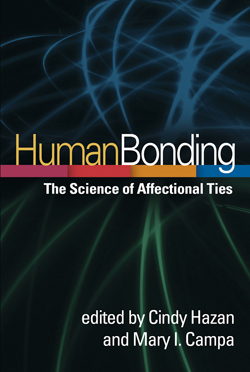Book looks at the ties that bind and buoy us
By Karene Booker

The new book "Human Bonding: The Science of Affectional Ties" (Guilford Press) provides a scientific roadmap to love, relationships and what makes them strong – from our first attachments in infancy through old age.
“It is amply documented that people with close social ties are happier, healthier and even live longer than those without such ties; indeed, our very survival as a species depends on the formation and maintenance of strong social bonds,” said Cindy Hazan, co-editor of the book, associate professor of human development in the College of Human Ecology and a founder in the field of relationship science.
“A central aim of this book is to provide an integrative, science-based overview of human bonding across the lifespan,” she said.
The book grew out Cornell’s popular course on human bonding, which Hazan designed and has taught for 25 years to capacity crowds, Hazan explained. Many students who took the course have gone on to become relationship scientists in their own right, she said, including seven of the contributors to the current volume.
"Human Bonding" addresses early bonding experiences from infancy through adolescence; mate selection, love and sexual desire, hooking up and online dating; keys to relationship success’ predictors and consequences of relationship dissolution; and the role of social connectedness in mental and physical health.
The book includes a chapter by Hazan and Gul Gunaydin, Ph.D. ’13, and Emre Selcuk, Ph.D. ’13, which integrates the social science evidence on the process of human mate selection. In it, the authors explain the many factors that influence how we narrow a large pool of potential mates down to one. For years, researchers focused on the characteristics that people say they seek in a mate, but more recent work has revealed that what we say we want in a partner differs significantly from who we actually end up partnering with. Proximity, the authors say, turns out to be a surprisingly influential factor.
The book, designed for students and relationship scholars, and those interested in understanding our closest – and often most perplexing – relationships, was co-edited by Mary Campa, Ph.D. ’07, assistant professor of psychology at Skidmore College.
Karene Booker is extension support specialist in the Department of Human Development.
Media Contact
Get Cornell news delivered right to your inbox.
Subscribe